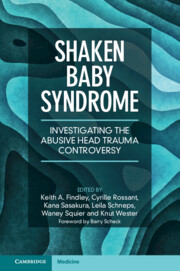Book contents
- Shaken Baby Syndrome
- Shaken Baby Syndrome
- Copyright page
- Dedication
- Contents
- Foreword
- About This Book
- Abbreviations
- Section 1 Prologue
- Section 2 Medicine
- Section 3 Science
- Section 4 Law
- Section 5 International
- Chapter 21 Ptolemy Rather Than Copernicus
- Chapter 22 Shaken Baby Syndrome in France
- Chapter 23 Shaken Baby Syndrome/Abusive Head Trauma in Sweden
- Chapter 24 Shaken Baby Syndrome/Abusive Head Trauma in Japan
- Chapter 25 Shaken Baby Syndrome in Australia
- Chapter 26 Shaken Baby Syndrome around the World
- Section 6 Postface
- Appendix: Frequently Repeated Claims concerning Shaken Baby Syndrome
- Index
- Plate Section (PDF Only)
- References
Chapter 25 - Shaken Baby Syndrome in Australia
from Section 5 - International
Published online by Cambridge University Press: 07 June 2023
- Shaken Baby Syndrome
- Shaken Baby Syndrome
- Copyright page
- Dedication
- Contents
- Foreword
- About This Book
- Abbreviations
- Section 1 Prologue
- Section 2 Medicine
- Section 3 Science
- Section 4 Law
- Section 5 International
- Chapter 21 Ptolemy Rather Than Copernicus
- Chapter 22 Shaken Baby Syndrome in France
- Chapter 23 Shaken Baby Syndrome/Abusive Head Trauma in Sweden
- Chapter 24 Shaken Baby Syndrome/Abusive Head Trauma in Japan
- Chapter 25 Shaken Baby Syndrome in Australia
- Chapter 26 Shaken Baby Syndrome around the World
- Section 6 Postface
- Appendix: Frequently Repeated Claims concerning Shaken Baby Syndrome
- Index
- Plate Section (PDF Only)
- References
Summary
The orthodox view of shaken baby syndrome (SBS) has been predominant amongst the medical and forensic communities for decades, over which time scores of accusations of child abuse have been made based on standard diagnostic methods, which have been scientifically verified. Convictions for murder, manslaughter and child homicide have resulted in jail sentences of up to 35 years, whilst actions taken through family courts have resulted in removal of children. We discuss how belief in SBS has been systematically incorporated into Australian medical, forensic, judicial, policing, and social service institutions. We also highlight some important challenges that have been made to the orthodox views in Australia, despite the ongoing general adoption of the orthodoxy.
Keywords
- Type
- Chapter
- Information
- Shaken Baby SyndromeInvestigating the Abusive Head Trauma Controversy, pp. 374 - 382Publisher: Cambridge University PressPrint publication year: 2023



